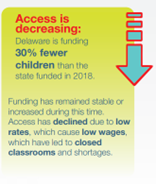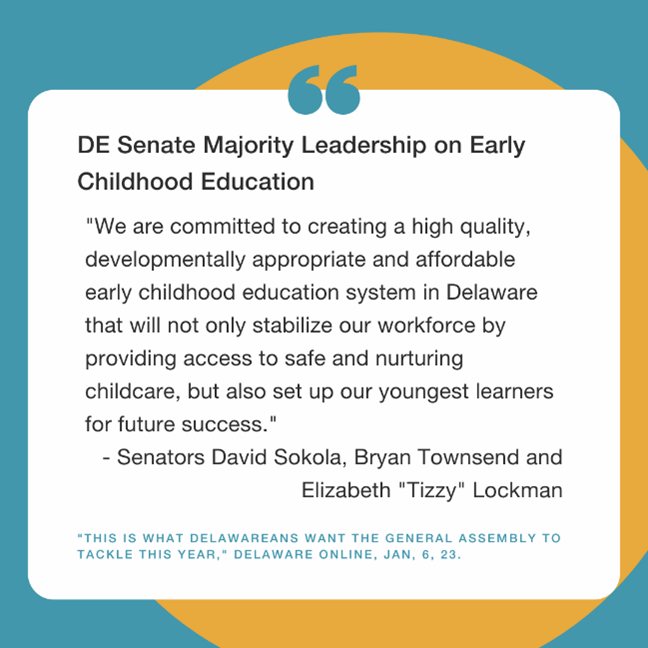Taking the Long View on Compensation in Delaware
In this blog, Madeleine Bayard, Senior Vice President at Rodel, details steps Delaware is taking to retain and recruit early child care workforce.

Madeleine Bayard
Madeleine leads Rodel’s policy, programmatic, government affairs, and communications initiatives. She is chair of the state Early Childhood Council, chair of the School Readiness Teams Advisory Committee, and a Delaware Commissioner and national Steering Committee member of the Education Commission of the States. She serves on the board of Delaware College Scholars, Reading Assist, Rotary Club of Wilmington, St. Michael’s School and Nursery, and Wilmington Children’s Chorus. Previously, Madeleine worked at the National Governors Association and The Alford Group. Madeleine earned a Bachelor of Arts degree in history from Wake Forest University and a Master of Public Policy from Georgetown University.
After years of conversation on the issue of early educator compensation, partners in Delaware have taken steps to identify concrete goals. In the short term, we are working to prevent losing any more of the workforce than we already have. Mid-term, we are building a system to recruit and support more early learning professionals. Long term, we must provide a living wage that is commensurate with K-12 salary schedules. Educators deserve to be treated like the professionals they are—regardless of the age of the children they teach. We are seeing momentum across these fronts—and we have a long way to go.
The Challenge
Like others around the country, Delaware’s child care programs have been down 20-25 percent capacity over the last few years due to staffing—and the state is serving 30 percent fewer children than we were several years ago in publicly funded programs, despite increased funding. The funding has not been enough to keep people in a profession that mostly has paid minimum wage without benefits.
In a recent survey of child care programs in Delaware, 100 percent reported lack of qualified workforce as a barrier to operations and opening classrooms—and 81 percent of providers have a waitlist. And they attribute these shortages to low wages.
 The state has used one-time federal funding to create a retention bonus program—individuals could receive $1,000 last year and up to $700 this year. We know this is a short-term, temporary solution.
The state has used one-time federal funding to create a retention bonus program—individuals could receive $1,000 last year and up to $700 this year. We know this is a short-term, temporary solution.
The state also committed federal funding to create the Early Childhood Innovation Center, which will provide scholarship navigation support, coaching, cohort-based models, and incentive funding for individuals who earn credentials and degrees. These supports are scheduled to launch July 2023.
Legislative Action
Our coalition—led by the Delaware Association for the Education of Young Children, Delaware Readiness Teams, Rodel, and First State Pre-k—has worked with legislators who have seen the need for workforce and compensation improvements. Today, many legislators have a solid understanding that shortages caused by low wages have led to families’ struggles to find care.
“There is a huge need for [child] care workers, which means providers can’t work to capacity. This creates a domino effect with ‘help wanted signs’ and families struggling to find options,” Representative Ruth Briggs-King noted in a recent article.
Working with members of our General Assembly, we passed several bills and resolutions to establish components of the system we need mid- and long term. In 2021, the General Assembly passed a resolution requiring the state to establish a target compensation scale for professionals, which created recommended levels of pay and associated policy recommendations. As salaries comprise the majority (70-80 percent) of the cost of care, the assumptions in the scale were major drivers when we worked with the legislature to require the state to create a cost estimation model to set state reimbursement rates. We were then able to establish how far off our current rates were from the system we aspire to and that children and professionals deserve. Depending on the age of the child and their county, the state would need to pay 12-86 percent more to cover the cost to provide the basic service required by state licensing rules. And 200-350 percent more would be required to cover true quality care.
In 2022, the General Assembly passed a bill to establish components of a workforce system, including codifying scholarships and wage supplements tethered to earning credentials and degrees, coaching, and community-based delivery of training, such as onsite at a child care center to reduce demands on time and transportation. Another focus was establishing alternative routes for educators who have a degree in a field other than early childhood education.
The bill required the creation of a workforce study needs assessment to report on number of individuals working in child care, their qualifications, and demographics, helping lawmakers prioritize initiatives and resources.
Mid-Term Efforts Underway
In order to leverage the momentum, the state has leveraged the one-time supplements to capture data from individuals in the field into our first professional registry. This type of system will help the state move toward our long-term goal of individual licensure for professionals in the field—rather than programs managing the credentials of each employee. The goal is for professionals to be treated as such, maintaining their own licensure like pre-K-12 educators.
With more resources from the federal Preschool Development Grant, the state has expanded our state funded preschool program to serve infants and toddlers in addition to three- and four-year olds, at a higher rate per child, through a contract that requires levels of compensation for qualified staff. This approach to contracting for seats—the same way K-12 funds a child for the school year regardless of their attendance month to month—is the model the state aspires to establish for more children and programs going forward. Not only will it pay programs sufficiently to cover salaries, it will stabilize their budgets and provide incentives for professionals to earn degrees and stay in the field. Educators should not be penalized for working with younger children, and children deserve high-quality opportunities with qualified educators, whether they attend a community-based preschool, Head Start, district program, or family child care.
Both these efforts are contributing to the interest in greater transparency from the General Assembly. They have passed bills requiring higher levels of quality for state pre-K and strongly communicated that they want to be sure funding in recent years is going to those doing the work. With these types of contracts and greater transparency and data, Delaware is working toward the long-term system we envision.
Critical Success Factors
Our momentum has been bolstered by a long-term vision by our Early Childhood Council. This has been complemented with grassroots advocacy and media attention—we now have local reporters calling the child care crisis a “huge topic”:
“It comes at a time when child care is a huge topic among employers who say a lack of affordable child care is keeping workers out of the job market. It also comes as the state seeks to increase the quality of child care services.”
– Delaware Live, March 8
These efforts have helped us gain support from legislators, and the General Assembly has been critical to set goals for quality and paying for those costs. We have seen most early care and education bills sponsored by at least 15 legislators from both parties in the House and Senate, and we have seen leadership across the finance, education, and social services committees. Their requirements with deadlines have helped stakeholders advance the work. In 2022, a resolution required quarterly reporting outlining how funds are being spent. Not only could we see the utilization of the current resources, we also now know what it would cost the state to pay for the true cost of quality.
Looking to the Future 
Compensation is about paying the early care and educator profession for the skilled work it does. Delaware has a long way to go to reach our aspiration of access for every child to a high-quality program with qualified, fairly compensated staff. We will continue to build on our foundation—the systems, data, contracts, and supplements that support the field today—and work with legislative leaders to continue to advance compensation to support our long-term goals.
Check out the Improving Child Care Compensation Video Series to hear more from Madeleine and other leaders whose work is covered in the Improving Child Care Compensation Backgrounder 2021.
Explore More
Collaborative Leadership and Power Lessons on Authentic Family and Community Partnerships
Video June 20, 2024
During this one-hour webinar, hosted in partnership with Vital Village Networks, you’ll witness the limitless wisdom and leadership that lives in our communities. Hear about best practices and lessons learned from prenatal-to-three (PN3) coalitions across the country that are working to shift and share power with parents and community partners. We’ll explore what it looks like to build trust and relationships while redesigning what it means to lead together for the health and wellbeing of our children.

Family Engagement
Report June 13, 2024
Family engagement at the state and local level is an essential component of high-quality, inclusive early childhood care and education (ECCE) programs and systems. Engaging families as partners during the early years allows parents and caregivers to establish strong connections that support their children’s development, well-being, and achievement long term.
Ideas for Incorporating Strategic Financing Efforts into Your PDG B5 Application
Report June 13, 2024
This resource outlines ideas for incorporating strategic financing efforts into your PDG B-5 application.
